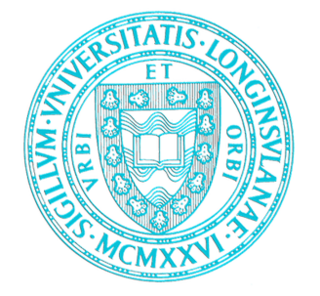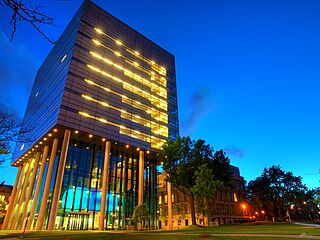
A pharmacist is a healthcare professional who specializes in the preparation, dispensing, and management of medications and who provides pharmaceutical advice and guidance. Pharmacists often serve as primary care providers in the community, and may offer other services such as health screenings and immunizations.

Long Island University (LIU) is a private university with two main campuses, LIU Post and LIU Brooklyn, in the U.S. state of New York. It offers more than 500 academic programs at its main campuses, online, and at multiple non-residential. LIU has NCAA Division I athletics and hosts the annual George Polk Awards in journalism.

The Medical University of South Carolina (MUSC) is a public medical school in Charleston, South Carolina. It opened in 1824 as a small private college aimed at training physicians and has since established hospitals and medical facilities across the state. It is one of the oldest continually operating schools of medicine in the United States and the oldest in the Deep South.

The Pharmacy College Admission Test (PCAT) was a computer-based standardized test administered to prospective pharmacy school students by Pearson Education, Inc as a service for the American Association of Colleges of Pharmacy (AACP); it is offered in January, July, and September. The test is divided into five sections to be taken in approximately three and a half hours. The test includes Writing, Biology, Chemistry, Critical reading, and Quantitative Reasoning sections. The composite score is based on the multiple-choice sections, and can range from 200 – 600. There is no passing score; pharmacy schools set their own standards for acceptable scores. Calculators are not allowed during the testing period and no penalty is given for incorrect answers.
Western University of Health Sciences (WesternU) is a private medical university in Pomona, California. With an enrollment of 3,724 students (2022–23), WesternU offers more than twenty academic programs in multiple colleges. It also operates an additional campus in Lebanon, Oregon.

The Appalachian College of Pharmacy (ACP), formerly known as the University of Appalachia, College of Pharmacy, is a private doctoral pharmacy school located in Oakwood, Virginia. The school, established in 2003, is Virginia's only three-year accelerated Doctor of Pharmacy program. ACP's mission is to improve the health outcomes of rural and underserved communities, particularly those in Central Appalachia, through education, service, and scholarship.
The basic requirement for pharmacists to be considered for registration is often an undergraduate or postgraduate pharmacy degree from a recognized university. In many countries, this involves a four- or five-year course to attain a bachelor of pharmacy or master of pharmacy degree.

The University of Florida College of Pharmacy is the pharmacy school of the University of Florida. The College of Pharmacy was founded in 1923 and is located on the university's Gainesville, Florida main campus. The college offers the entry-level Doctor of Pharmacy (Pharm.D.) degree as the first professional degree for students entering the profession. The college offered a Working Professional Pharm.D. (WPPD) program for bachelor's-trained pharmacists already in practice with its last cohort of students enrolled in 2016. Additionally, various graduate degrees are offered. The professional program is fully accredited by the American Council on Pharmaceutical Education. Since 2011 the college has been offering online degree programs at the graduate level, such as the Forensic Science Program, Pharmaceutical Chemistry Program and Clinical Toxicology Program. In total the College of Pharmacy received over $32 million in total Research Revenues in 2021.
The University of Pittsburgh School of Pharmacy is the graduate pharmacy school of the University of Pittsburgh in Pittsburgh, Pennsylvania, United States. Founded in 1878, it offers Doctor of Pharmacy (PharmD) and Doctor of Philosophy (PhD) degrees, as well as a residency training program. The school is one of the university's six schools of the health sciences and is ranked in the top 10 of pharmacy schools according to U.S. News & World Report.

The Leslie Dan Faculty of Pharmacy is a pharmacy school and an academic division of the University of Toronto. The school is located on the northwestern corner of College Street and University Avenue, placing it across from the Ontario Legislative Building and at the entrance to Queen's Park station. It is also situated near four internationally renowned hospitals—The Hospital for Sick Children, Princess Margaret Cancer Centre, Toronto General Hospital and Mount Sinai Hospital. It is part of Toronto's Discovery District.
The Australasian College of Pharmacy (ACP) provides professional education for the pharmacy industry in Australia and New Zealand and has done so for over 40 years. Members of the college are entitled to use the postnominal MACP, Associate Fellows AFACP, while Fellows of the college use FACP.
Roseman University of Health Sciences is a private university focused on healthcare and located in Henderson, Nevada. It has a second campus in South Jordan, Utah. It was founded by Dr. Harry Rosenberg, enrolled its first class in January 2001, and was originally called the Nevada College of Pharmacy and the University of Southern Nevada.

Widya Mandala Catholic University, commonly abbreviated as WMCU is a major private Roman Catholic university in Indonesia, located in the heart of Darmo District in Surabaya, East Java - Indonesia.

The Joint Commission of Pharmacy Practitioners (JCPP) is the largest professional delegation representing the interests of pharmacists within the United States. JCPP represents 13 professional associations in the field of pharmacy, developing consensus policy directives for the profession. It is well known for the 2014 development of "The Pharmacists’ Patient Care Process," which provides broad, consensus guidelines for how clinical pharmacists should practice.

A clinical pharmaceutical scientist is a licensed, practicing pharmacist who also functions as an independent researcher in the pharmaceutical sciences. Clinical pharmaceutical scientists are a type of clinician scientist, analogous to physician-scientists.
Hartmut Derendorf was a German-American pharmacist and clinical pharmacologist, a distinguished emeritus professor of pharmaceutics at University of Florida. A significant figure in his field, Derendorf published over 20 papers each with over 100 citations.
The University of Iowa College of Pharmacy is an accredited pharmacy school located in Iowa City, Iowa. The college offers three undergraduate certificates, four areas of graduate study leading to the Doctor of Philosophy (PhD) degree, and a four-year professional program leading to the Doctor of Pharmacy (PharmD) degree. University of Iowa Pharmaceuticals (UIP), an FDA-registered manufacturer, is housed within the college. UIP is the largest and longest-running university-affiliated pharmaceutical manufacturing facility in the U.S.
California Health Sciences University (CHSU) is a private, for-profit university located in Clovis, in the U.S. state of California. Founded in 2012, the school operates three academic programs, two of which offer doctoral degrees in pharmacy and osteopathic medicine, and the third offers a masters degree in science. Graduates of the College of Pharmacy (COP) will receive the Doctor of Pharmacy (Pharm D) degree, graduates of the College of Osteopathic Medicine (COM) will receive the Doctor of Osteopathic Medicine (DO) degree, and graduates of the College of Biosciences and Health Professions (CBHP) will receive the Masters of Science in Biomedical Sciences (MSBS) degree. The College of Osteopathic Medicine is fully pre-accredited by the American Osteopathic Association's (AOA) Commission on Osteopathic College Accreditation (COCA). The college is accredited by the Western Association of Schools and Colleges (WASC) Senior College and University Commission and has approval to operate from the Bureau of Private Postsecondary Education (BPPE).









